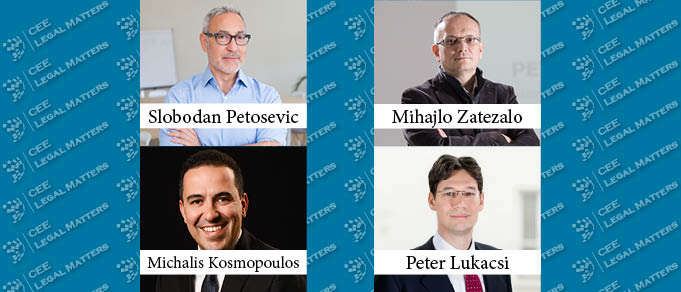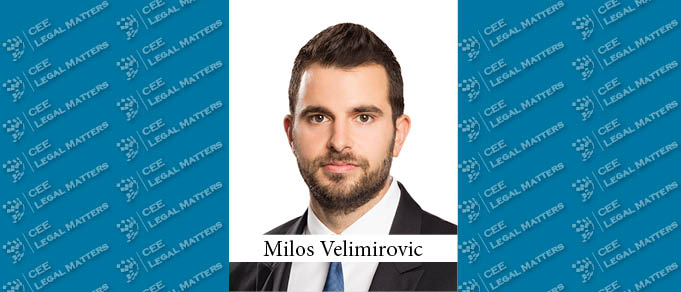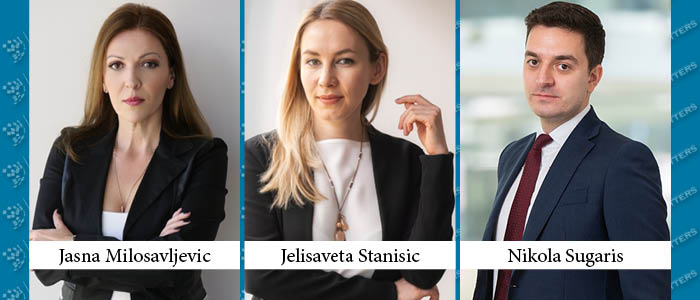Practicing IP has always been a tricky matter, given the complexity and the diversity of this area of law. We reached out to experts from several IP-focused law firms – Hungary’s SBGK, Serbia’s Petosevic Group, and Greece’s Drakopoulos – to learn more about their origins, specializations, structures, and operations.
Busy in the Balkans – The Petosevic Group
The Petosevic Group is among the most prominent IP-focused firms in the Balkans. The group was founded almost three decades ago by Slobodan Petosevic – who remains at the helm today. “We initially placed our focal point on the Balkans,” Petosevic says, “and have since expanded our area of operations with a focus on the East European jurisdictions emerging after the breakup of the USSR and Yugoslavia.”
Petosevic’s business, which started in 1992 in Belgium, was “rooted in a small operation from which East European IP client work was coordinated during the emergence of new markets,” Petosevic remembers. “As the new Eastern European jurisdictions evolved, it was clear that it would be difficult to provide uniform service through a network of independent providers, varying in knowledge, ability, standards, and costs. It became necessary and logical to have the majority of the workforce move to the countries in which our clients sought the services, so a number of local companies were established in the countries of the Balkans area.”
Starting with a few markets, Petosevic gradually expanded and eventually shifted its headquarters from Belgium to Luxembourg in 2005, consolidating the governance of the entire network. Today, the group consists of wholly-owned entities in Albania, Belarus, Bosnia & Herzegovina, Bulgaria, Croatia, Hungary, Kazakhstan, Montenegro, North Macedonia, Romania, the Russian Federation, Serbia, Slovenia, Ukraine, and Uzbekistan and affiliated offices in Armenia, Azerbaijan, the Czech Republic, Estonia, Georgia, Kosovo, Kyrgyzstan, Latvia, Lithuania, Moldova, Poland, Slovakia, Tajikistan, and Turkmenistan.
Altogether, the Petosevic Group consists of more than 130 people specializing in IPR prosecution and enforcement, along with advertising law, data protection and privacy, franchise law, and media and entertainment law.
“Our offices in Belarus, Kazakhstan, Russia, Ukraine, and Uzbekistan reflect our clients’ requests for a more direct representation in former USSR countries,” Petosevic says. “In addition, we also have partner firms throughout the EU, Eastern Europe, and the Russian-speaking region and also act as a coordinating hub for IP-related services worldwide.”
Busy in Belgrade
The firm’s impressive size includes more than 50 lawyers and over 30 IP agents.
The network’s largest office is in Serbia, where 30 professionals ply their trade. “Our attorneys and IP professionals are well-respected local IP experts and are supported by a team of experienced and multilingual paralegal and administrative staff,” reports Mihajlo Zatezalo, who heads the Belgrade office and acts as Regional Manager overseeing operations in the non-EU Balkan countries of Albania, Bosnia and Herzegovina, Macedonia, and Montenegro.
“The Belgrade team includes five attorneys, five Serbian trademark and patent attorneys, four European patent attorneys, two paralegals, and seven administrative assistants,” Zatezalo continues. “Our Serbia office also hosts our firm’s other departments – marketing, HR, and IT.”
Given the diverse nature of IP work, and the fact that the Petosevic Group’s biggest office is based in a non-EU country, Zatezalo’s team operates in a dynamic environment. “Over the past couple of decades, legislation has changed several times, and even the country we live and work in today is not the same country as several years or decades ago,” he says. “The local laws are now to a large extent harmonized with EU directives in the IP field, but the legislation is still frequently amended in order to fully comply.”
Zatezalo considers that, in general, IP legislation and law enforcement practices have advanced significantly in recent years. “I feel that our firm played a significant part in this,” he says, pointing to the international scope of the projects the team has undertaken and other regular activities.
Still, Zatezalo says, it’s not perfect. “Despite a strong legislative framework, improvements are generally needed in terms of training and specialization of officials, prosecutors, judges, and court panels handling IP rights; coordination and cooperation among various institutions in charge of IP protection; and raising public awareness of IP rights.” Even with recent improvements, he says, his team often needs to “go the extra mile” in order to win a case. “Precisely for this reason, we try to always invest additional effort wherever and whenever possible.”
Keys to Success
Of course, challenges exist across the region.
“Over the last 30+ years it has become clear that the quality of IP services in Eastern Europe and the Russian-speaking region is, generally speaking, below the West European level,” Petosevic says. “Most of the local firms grew out of IPR prosecution-only based businesses, focusing on administrative, mainly patent-related procedures and the related translations. Understandably, they comparatively lack experience in IPR enforcement and providing complex legal advice to foreign IP rights holders.”
That inexperience created a market opportunity in CEE’s larger markets, which Western firms were quick to recognize and address. According to Petosevic, larger Western firms, which “are built on substantive practice and case law, have, more or less, successfully entered the largest and most lucrative markets in Eastern Europe, leaving a significant gap in the smaller countries and covering the larger regions only partially.” This, he believes, is where Petosevic steps in.
“We believe that a blend of well-established Western practices and best local practices established by local courts and practitioners is the best way to cover these gaps,” Petosevic says. “While providing IPR protection services throughout our region for major companies from Western Europe, the United States, and other developed countries, we employ individuals who have been educated and worked in the West, and who train our staff to bring Western standards to less developed and sophisticated jurisdictions.”
Changes in technology will allow his team to be of even greater service soon as well, Petosevic says, noting that the physical presence of individual lawyers is already significantly less important than it was in the past. Now, lawyers based anywhere in the world remain able to focus on a wide range of markets. “Consulting on only one jurisdiction is increasingly a thing of the past,” he says, and notes that the kind of work being done is changing as well. “There is a clear need for more complex legal advice in this field today. In the past, the accent was on the processing of applications, whereas today the contentious arena is taking over.” As a result, he says, “our long-term goal is to prepare our professionals for what they will be required to do tomorrow.”
Looking Ahead
The Petosevic Group’s motto – “embracing change” – accurately reflects the firm’s efforts to bridge the gap between Eastern and Western European IP practices. “We strive to bring together the best of both worlds and save time and money for our clients through tailor-made solutions, at a reasonable cost,” Petosevic says.
The firm’s workload is more or less constant across all the group’s offices, Petosevic says, but he reports that, “we have experienced an increase in workload in our offices in the Russian-speaking region, especially in Russia and Ukraine, and these two offices have grown significantly over the last several years.” The firm seeks to expand its team in these markets, and expand to other geographical areas in order to provide its client base with more direct representation.
Seizing SEE – Drakopoulos
At about the same time that Petosevic was beginning its expansion through the northern Balkans, another intellectual property-focused law firm came into being in Greece. Founded in Athens in 1992 by Panagiotis Drakopoulos, with a primary focus on IP and regulatory matters, the Drakopoulos law firm has since expanded to Romania in 2005, Albania in 2007, and Cyprus in 2016.
Now, Drakopoulos Partner Michalis Kosmopoulos reports, in addition to IP, the firm’s 40 practitioners advise on corporate, M&A, banking and finance, real estate, employment, regulatory and compliance, dispute resolution, TMT, tax, and EU and competition matters. “We are a full-service law firm, advising both domestic and international clients, oftentimes with arrangements covering multiple countries in the region for the same client through a single interface,” Kosmopoulos says, “both in terms of instructing and invoicing, as clients with a multinational presence tend to see the entire SEE as a single market, despite the different jurisdictions it comprises.”
Expansion Rationale
In establishing its regional footprint, Kosmopoulos says Drakopoulos recognized that SEE “had the potential to be on the right track in terms of growth rates and investment returns, but still had to battle against severe material headwinds, including stalled revenues, fiscal easing measures in some of its countries, and investors buckled up in view of financial turbulence.”
And the firm expanded into each new jurisdiction with a distinct rationale. Kosmopoulos describes Romania, for instance, as having a promising future and presenting a stable and low-risk business environment for multinational and global industry players, which is why it made sense for Drakopoulos to expand its operations there. “With Romania’s economy expanding significantly, most of our clients seemed to be comfortable choosing it as a basis for their business expansion into the SEE,” he says.
“The fact that SEE consisted of an impressive mixture of countries with radically different economies and levels of market development was further ratified by the presence of Albania in the same zone,” Kosmopoulos continues. He says that during the years of Drakopoulos’ presence in that Balkan country, “we were able to experience the transformation of one of the poorest nations in Europe into a state geared towards being an autonomous market-oriented economy.”
Finally, five years ago, Drakopoulos expanded into Cyprus, with an office in Larnaca opening its doors in 2016. “Cyprus has been showing steadily increasing growth rates over the last few years,” Kosmopoulos says, “and it managed to reach the end of 2016 with its economy on a solid footing.” He says that Cyprus offered a strong regulatory environment, “with enhanced compliance measures and risk management procedures” benefitting investors.
In opening the Cyprus office, Drakopoulos completed its four-pronged office placement. According to the firm’s partners, the firm’s presence in these locations, combined with a best-friends network across SEE, allowed it to provide a comprehensive engagement with a number of clients.
“In the context of all of the above, we saw the need for effective management and enforcement of intellectual property rights in a changing economic landscape,” Kosmopoulos emphasizes. “Especially in Romania, the harmonization process created a framework with which we were already familiar, while in Albania the long accession route would eventually change the IP landscape through a harmonization route.” According to him, “we are, therefore, in a position to put in use the longstanding experience we have already accumulated in Greece.”
Network Operations
Still, it’s the firm’s original base that’s busiest. “When it comes to IP, our Athens office generates the most work,” Kosmopoulos says. The firm’s Athens office consists of five lawyers and three administrative employees, including paralegals and investigators. “Our Athens office also drives the operations in Cyprus, where two lawyers and one paralegal handle cases on the ground,” he says. The firm’s regional team is rounded out by three lawyers and a paralegal in Romania and two lawyers in Albania that focus on IP matters.
“The main challenge when we started our expansion was recruiting lawyers and supporting personnel which would be skilled and experienced, while at the same time possessing excellent command of the English language and business-oriented minds,” Kosmopoulos says. Another hurdle has been conflict checks, which Kosmopoulos describes as “endemic to law firms with a wide footprint across multiple jurisdictions.”
“Finally,” he says, “fighting corruption and achieving the rule of law remain to be accomplished for several countries in the region, which makes operating with ‘Western’ standards challenging, to say the least.”
History in Hungary – SBGK
As the first patent attorney in Hungary, Tibor Schon started offering legal advice and services in 1896. Following his father into the law, Schon’s son Tibor Somlai qualified as a lawyer in 1929. Forty years later, in 1969, together with fellow patent attorneys Ferenc Biro and Andras Beliczay and lawyers Tibor Sasvari and Bela Kende, Somlai laid the foundation of what would eventually become SBGK.
“SBGK was the first private firm which combined the knowledge of attorneys at law and patent attorneys,” says current SBGK Partner Peter Lukacsi. “Since the foundation of SBGK, the world has completely changed, but our commitment to the Hungarian market and our clients remained the same. Consequently, our office is still owned exclusively by Hungarian partners and we are extremely proud that many of our clients have trusted us as a partner for decades.”
Growing and Growing
As a private law firm during socialist times – dealing with IP and owning a foreign currency account – SBGK was a rare animal. Its unique positioning allowed the firm to accept many foreign assignments, Lukacsi reports. “This was a great achievement which created trust in our foreign clients,” he says, noting that the firm negotiated the political/economic transformation of 1989 well. “After the regime change, we were able to maintain our position by working hard – and also because the international law firms that entered the Hungarian market focused on other legal areas, most notably Corporate/M&A and Finance law.”
SBGK retains its deep client base. According to Lukacsi, the firm has “many Hungarian clients – subsidiaries of multinational firms interested in our competition or IP law experience and Hungarian enterprises that have grown substantially in recent years and need IP law advice both in Hungary and globally.”
And not just IP. Lukacsi notes that “changes in the economic, political, and legal environment, client needs and expectations, and the changed market environment have also diversified SBGK’s professional range during the last couple of years.” As a result, “today we represent our clients in a wide variety of complex mandates,” he says, including in “data privacy and data protection, franchise and licensing, competition law, labor and employment law, and high-level real estate matters, as well as M&A mandates.”
In addition, he says, SBGK continues to serve foreign clients from all over the world – in particular from the EU and the USA. “Nowadays, SBGK provides services in all commercial law and IP law areas, to both domestic and international clients from more than 20 sectors, and we help companies with their day-to-day operations in corporate and commercial legal aspects as well.”
The firm’s growth has, according to Lukacsi, been based on offering high-quality business-focused legal services while building and maintaining long-term client relationships. “The combination of our attorneys-at-law’ and patent attorneys’ knowledge, as well as cross-referrals, has also been a source of growth and incoming work,” he says. “Building and maintaining professional contacts worldwide and being active in domestic and international professional IP organizations have also been important factors for decades.”
International in Budapest
Unlike Petosevic’s extensive network and Drakopoulos’ regional SEE footprint, SBGK continues to consolidate and concentrate all its operations in its one Budapest office, where the firm has 21 lawyers, ten patent attorneys, and over 50 other staff members.
Lukacsi emphasizes SBGK’s international capabilities, however. “Although SBGK has just one office worldwide, and we are a Budapest-based office, SBGK is able to offer not only professional services but also a broad network of international contacts, which includes well-known national and international firms of attorneys-at-law and patent attorneys.” Thus, he says, SBGK is able to provide “global representation to well-known companies and brands” as well as to “be responsible for the global management of entire trademark and IP portfolios belonging to world-famous organizations.”
Indeed, he notes, SBGK’s attorneys and patent attorneys hold positions with various important international IP organizations. “SBGK itself is the Hungarian member of LNI, which is a network of independent law firms covering over fifty countries worldwide; the Antitrust Alliance, which brings together the knowledge and resources of independent specialized antitrust teams across the EU to provide clients with complete competition law counseling; and, most recently, we joined the Distribution Law Center.”
Among its notable mandates, Lukacsi says with a smile, the firm coordinates the “international network of lawyers responsible for the IP protection of the most famous Hungarian invention – the Rubik’s Cube.”
This Article was originally published in Issue 8.12 of the CEE Legal Matters Magazine. If you would like to receive a hard copy of the magazine, you can subscribe here.




















